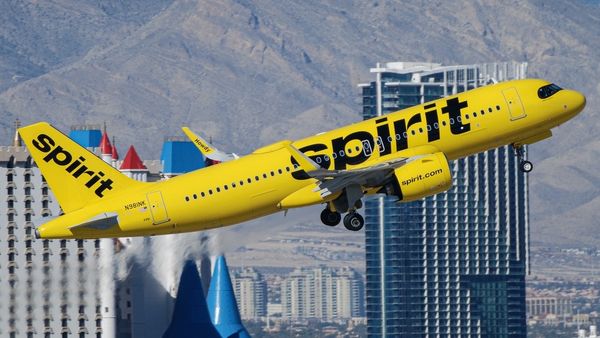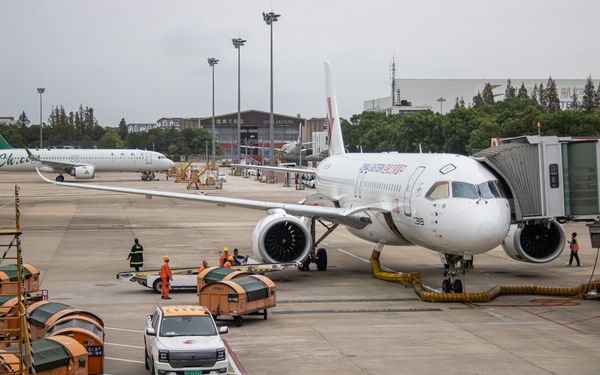On Thursday, the Trump administration proposed a rule that would bar Chinese airlines from using Russian airspace on flights to and from the United States, arguing that doing so gives them an unfair advantage over U.S. carriers competing for passengers.
Since 2022, the United States has barred Russian airlines from operating flights to American cities, a move made in protest of Russia's invasion of Ukraine. In response, Russia banned American carriers from entering its airspace.
The US Department of Transportation (DOT) said in its proposed order that the ability of Chinese airlines to still overfly Russia has imposed substantial negative impacts on U.S. airlines, since American carriers are unable to do the same.

The proposed rule would extend similar restrictions to Chinese airlines that operate under U.S.-issued foreign air carrier permits, though it would not include cargo-only operations.
The order could impact several big Chinese carriers, such as Air China, China Eastern, China Southern, and Xiamen Airlines. Hong Kong-based Cathay Pacific, which is still sending flights over Russia on its New York–Hong Kong route, was not listed in the proposal.
 Ad by Jetstream Magazine by AeroXplorer.
Ad by Jetstream Magazine by AeroXplorer.
The Chinese airlines have two business days to provide their rebuttal, with the final order potentially taking effect as soon as November, according to the DOT.
The Chinese Ministry of Foreign Affairs condemned the U.S. restrictions as damaging to person-to-person exchanges and called on Washington to take into account how its measures restrict its own companies.

The announcement comes after Beijing announced on Thursday that it would increase restrictions on rare earth exports essential to the U.S. industry, further escalating trade frictions between the world’s two largest economies.
The move adds to a growing list of disputes, including tariffs, technology, and ease of travel. The timing also coincides with planned October-end talks between President Donald Trump and Chinese President Xi Jinping in South Korea.
The response to this proposal on Chinese financial markets could be seen almost immediately. Shares of China Southern fell 1.8%, while Air China dropped 1.3% and China Eastern slipped 0.3% by midday on Friday.

The trio of state-owned carriers has recorded five straight years of annual losses since the pandemic and is highly dependent on international routes to reverse its fortunes.
The offer also comes as Boeing and Chinese officials hold discussions about a potential purchase of up to 500 aircraft, which could aid in rebuilding the U.S.-China aviation horizon.
For the time being, U.S. carriers say their lack of access to Russian airspace means direct East Coast routes to China are nearly uneconomical.
Inside the Cockpit: Interviews with Young Pilots Getting Their Wings » How to Study Aerospace Engineering and Succeed as a University Student » Beijing's Boeing: What It's Like Onboard China's COMAC C919 »
Comments (0)
Add Your Comment
SHARE
TAGS
NEWS Trump President USA China Travel US-ChinaRECENTLY PUBLISHED
 Spirit Airlines Cancels Airbus Order Amid Post-Bankruptcy Restructuring
Spirit Airlines, a prominent American low-cost carrier, has faced significant turbulence, leading to its decision to cancel a massive order for Airbus aircraft.
NEWS
READ MORE »
Spirit Airlines Cancels Airbus Order Amid Post-Bankruptcy Restructuring
Spirit Airlines, a prominent American low-cost carrier, has faced significant turbulence, leading to its decision to cancel a massive order for Airbus aircraft.
NEWS
READ MORE »
 Riyadh Air to Launch Inaugural London-Heathrow Flight October 26
Riyadh Air, the Saudi Arabian national airline, will launch its first international flights to London’s Heathrow airport (LHR) starting 26th October. The first flights will be flown daily with one of the airline's Boeing 787-9 aircraft, Jamila, which is currently designated as a technical spare.
ROUTES
READ MORE »
Riyadh Air to Launch Inaugural London-Heathrow Flight October 26
Riyadh Air, the Saudi Arabian national airline, will launch its first international flights to London’s Heathrow airport (LHR) starting 26th October. The first flights will be flown daily with one of the airline's Boeing 787-9 aircraft, Jamila, which is currently designated as a technical spare.
ROUTES
READ MORE »
 Beijing's Boeing: What It's Like Onboard China's COMAC C919
Aboard China's COMAC C919, I experienced more than just a flight; I witnessed China's ambition to challenge decades of Western dominance in the skies. Could China really build a world-class passenger jet?
TRIP REPORTS
READ MORE »
Beijing's Boeing: What It's Like Onboard China's COMAC C919
Aboard China's COMAC C919, I experienced more than just a flight; I witnessed China's ambition to challenge decades of Western dominance in the skies. Could China really build a world-class passenger jet?
TRIP REPORTS
READ MORE »




